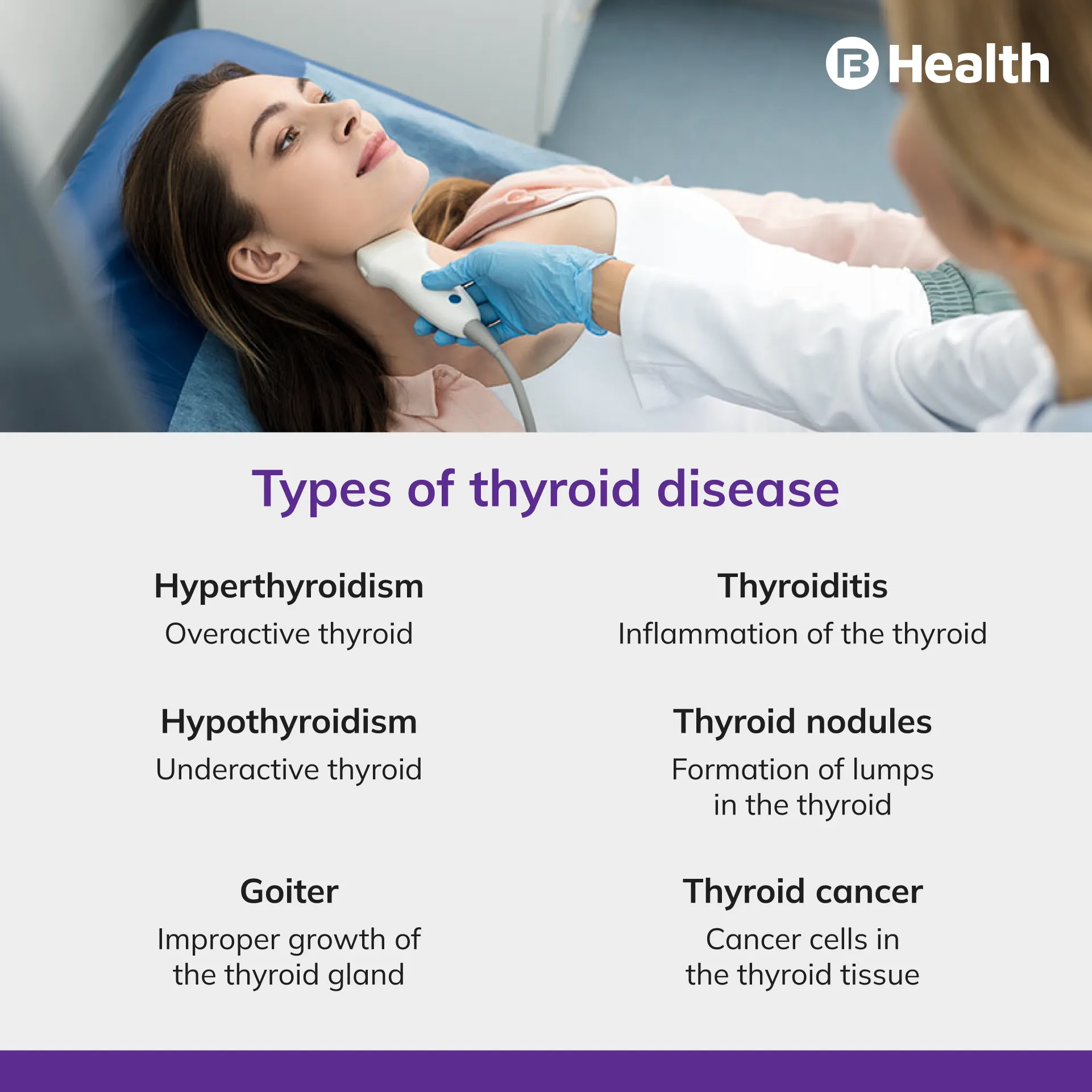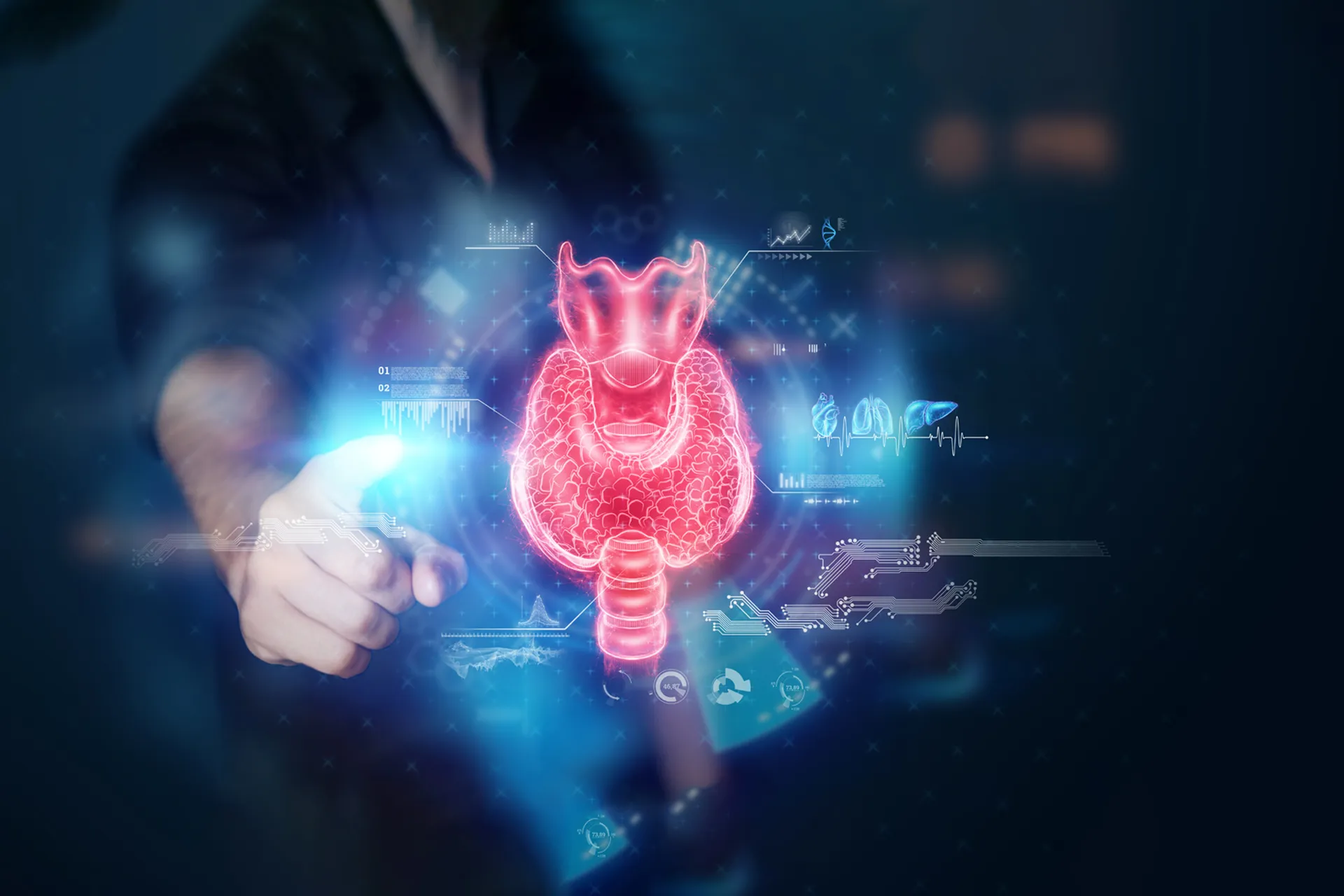Thyroid | 8 min read
Hyperthyroidism: 14 Signs You Need to Check Your Thyroid Hormone Function
Medically reviewed by
Table of Content
Key Takeaways
- An imbalance in thyroid hormone function can cause many problems
- Fatigue and sleeping difficulties are signs of hyperthyroidism
- Random changes in weight and appearance are concerning issues
The thyroid hormone plays an important role in how your body functions. Loss or gain of weight, change in heart rate and energy levels, and metabolism are some of them. This is why learning about the thyroid’s effect on your health and taking crucial thyroid tests on time is important. An imbalance in thyroid hormone function can cause problems related to your heart, eyes, fertility, bones, and more.
According to a study, around 42 million people in India suffer from thyroid disease [1]. Common thyroid ailments include goiter, thyroid cancer, hypothyroidism, and hyperthyroidism. Heart palpitations, weight loss, and sleep issues are some common signs of hyperthyroidism [2]. In India, hypothyroidism is more common and doesn’t have too many symptoms in early stages. Abnormal puberty or menstruation are some adverse thyroid effects in females [3].
To address such issues at the right time, read about the signs that indicate you may have a thyroid problem.
Thyroid Symptoms
Muscle and Joint Aches
A lack of thyroid hormone causes the metabolic shift to catabolism. It is when the body breaks down its tissues to produce energy. Muscle strength decreases during catabolism, potentially leading to feelings of weakness. Everyone experiences weakness from time to time. On the other hand, hypothyroidism patients are twice as likely as healthy individuals to experience excessive weakness. Nearly one-third of low-thyroid individuals get muscle cramps. Restoring low levels of thyroid hormone with a synthetic thyroid hormone called levothyroxine improves muscle strength and decreases aches and pains, compared to no treatment. Weakness and aches are common after strenuous activity. However, new increasing weakness or aching is a reason to consult your doctor.
Neck Inflammation
A visible indicator that the thyroid is malfunctioning is a swelling or enlargement in the neck. Both hyperthyroidism and hypothyroidism can result in a goiter. Thyroid nodules or lumps that develop inside can occasionally cause swelling in the neck. Swelling in the neck could also be caused by something unrelated to the thyroid.
Varying Heart Rate
Thyroid hormones influence nearly every organ in the body, including the rate at which the heart beats. Hypothyroid patients may observe that their heartbeat is slower than regular. Hyperthyroidism may cause the heart to beat faster. It can also cause high blood pressure and the sensation of a pounding heart, and another type of heart palpitation.
Difficulty Concentrating
Mental cloudiness and attention problems are two effects of hypothyroidism. People experience different levels of mental confusion. People with low thyroid function reported having more trouble with simple math, thinking more slowly than usual, and having poorer memories. Untreated hypothyroidism affects both men and women, and it can make it difficult for them to remember verbal cues. Everyone occasionally experiences memory or concentration problems, but if they are sudden or severe, they may indicate hypothyroidism.
Dry and Itchy Skin
Skin cells and hair follicles have the same turnover rate. As a result, they are also vulnerable to losing thyroid hormone-induced growth signals. The skin may take a longer time to regrow. It indicates that the skin's outer layer has endured more harm over time. Additionally, it implies that the shedding of dead skin might be slower, resulting in flaky, dry skin. Hypothyroid patients said that their skin had gotten worse over the previous year. Autoimmune conditions can sometimes lead to hypothyroidism. Myxedema, a situation where the skin becomes swollen and red, can result from this. Compared to other causes of dry skin, myxedema is more specific to thyroid issues.
High Cholesterol
The liver removes extra cholesterol from the body with the help of thyroid hormones. However, low hormone levels make it difficult for the liver to perform this function, which can increase blood cholesterol levels.
Some people who have high cholesterol also have hypothyroidism. As a result, many experts advise doctors to routine check for hypothyroidism in people having high cholesterol.
Hair Loss
Untreated hormonal conditions, such as thyroid issues, can cause hair loss. It is because thyroid hormones are necessary for the development and well-being of hair follicles. Hair loss from the
· Scalp
· Eyebrows
· Legs
· Other body parts
Alopecia, an autoimmune disorder that causes patchy hair loss, is another condition more likely to develop in people with thyroid issues.
Weight Change
Unexplained weight gain or loss can be a sign of problems in your thyroid hormone function. In hypothyroidism, the inability of your body to produce enough thyroxine slows down your metabolism. This leads to weight gain. On the other hand, hyperthyroidism leads to an excess production of this hormone. This causes weight loss. When your weight changes without any changes in your activities and diet, it could be due to the thyroid's effect on your health.

Excessive Tiredness
Do you feel tired all the time? This could be due to thyroxine side effects. You may find it difficult to sleep at night and feel fatigued due to hyperthyroidism. In the case of hypothyroidism, your body is deprived of thyroxine. This leads to depletion of energy. Thyroid problems can lead to weakness of muscles, which makes you feel excessively tired. Exhaustion and sleepiness along with other symptoms can be a sign of a severe health condition. Take a thyroid test to rule out such issues.
Changes in Appearance
An easy way to spot an under or overactive thyroid’s effect on your health is by noticing any differences in the way you look. You may experience skin issues, hair problems, a puffy face, and swelling near your neck and in your joints. Losing hair may be a sign of an overactive thyroid. Hyperthyroidism can even lead to oily skin, acne, or breakouts. On the other hand, hypothyroidism causes dry or itchy skin.
Low Mood and Energy
A thyroid disorder can lead to hormonal changes. This causes changes in your behavior. Symptoms such as anxiety, restlessness, insomnia, and irritability may indicate hyperthyroidism. On the other hand, signs like fatigue, low energy, sleepiness, and depression are associated with hypothyroidism. People who have hyperthyroidism often struggle with anxiety, which makes them feel angry and lose control of their emotions. You may even find it difficult to get along with other people.
Sensitive to Temperature Change
Feeling excessive cold, sweating or getting hot flashes even at normal temperatures may signal a thyroid disorder. Problems in the thyroid hormone function can make you feel too hot or too cold. For instance, hyperthyroidism may cause sensitivity and make it difficult for you to tolerate heat. People with hypothyroidism usually feel extreme cold irrespective of clothing and temperature. Weight changes due to thyroid disorders can also affect your sensitivity to heat and cold.
Digestive Issues
Hormonal changes due to thyroid problems can affect your metabolism and digestion. However, you should consult with your doctor as this may also be due to other causes. People who have hypothyroidism often experience constipation. Those with an overactive thyroid notice loose stools more frequently. Do not neglect the digestive issues as they may signal thyroid disorders.
Menstrual Irregularities
Thyroid disorders can affect the flow and frequency of menstrual cycles, causing irregularities. They may also affect your fertility and sexual performance. For instance, a deficiency of thyroid hormones makes it difficult for your body to release eggs that are needed for ovulation. This weakens overall fertility in women. Women who have thyroid issues are also at risk of problems such as miscarriage during pregnancy. These are some abnormal thyroid effects in females.
Additional Read:
Watch out for these signs and seek medical help at the earliest if you notice them. You can also undergo crucial thyroid tests to keep a check on the health of your thyroid. Book a lab test or a online doctor consultation on Bajaj Finserv Health with ease. This way, you can get solutions to problems like thyroid eye disease and also learn more about thyroxine side effects if there is under- or over-production. Get to know what increases thyroid levels and what you need to do to keep your symptoms in control!
Thyroid Symptoms in Males
If any of the ten signs or symptoms listed below are present in males, especially young males, it may be possible that they have thyroid disease:
- Rapidly increasing hair loss
- Lack of libido (reduced sex drive)
- Reduced strength and muscle mass
- Gynecomastia (male breast enlargement)
- Inability to maintain an erection
- A sluggish ejaculation (difficulty reaching climax and ejaculating)
- An early ejaculation (climaxing early due to hypersensitivity)
- Testicular enlargement (shrinking testicles)
- Infertility (due to low sperm count or quality)
- Fractures in hips and spines (most commonly in older males)
Thyroid Symptoms in Females
Thyroid issues in women can occur at any age and frequently cause symptoms such as fatigue, weight gain, hair loss, and mood changes. In addition, thyroid disease causes the thyroid gland to become hyperactive or hypoactive, resulting in hyperthyroidism and hypothyroidism. Here are a few symptoms of thyroid in females:
- Anxiety
- Rapid heartbeat
- Weight loss
- Increased appetite
- Sweating
- Tremors
- Irritability
- Menstrual irregularities
- Fatigue
- Weight gain
- Cold sensitivity
- Dry skin
- Constipation
- Depression
- Hair loss
- Muscle weakness
Thyroid Symptoms in Children
If you are concerned about a possible problem, examining some of the most common symptoms and signs can guide you.
- Small stature or slow growth
- Dry, rough skin
- Constipation
- Cold intolerance
- Fatigue and decreased energy
- Sleepiness
- Bruising easily
- Bone fractures
- Delayed puberty
- Emotional liability, sobbing frequently, irritability, or excitability
- Short attention span
- Tremors
- Increased appetite
- Weight loss
- Enlarged thyroid gland (goitre)
- Exophthalmos (protruding eyes)
- Upper eyelid lag
- Infrequent blinking
References
- https://www.ncbi.nlm.nih.gov/pmc/articles/PMC3169866/#:~:text=According%20to%20a%20projection%20from,India%20suffer%20from%20thyroid%20diseases.
- https://my.clevelandclinic.org/health/diseases/14129-hyperthyroidism
- https://www.hopkinsmedicine.org/health/conditions-and-diseases/thyroid-disorders-in-women#:~:text=Thyroid%20disorders%20can%20cause%20puberty,(a%20condition%20called%20amenorrhea)
Disclaimer
Please note that this article is solely meant for informational purposes and Bajaj Finserv Health Limited (“BFHL”) does not shoulder any responsibility of the views/advice/information expressed/given by the writer/reviewer/originator. This article should not be considered as a substitute for any medical advice, diagnosis or treatment. Always consult with your trusted physician/qualified healthcare professional to evaluate your medical condition. The above article has been reviewed by a qualified doctor and BFHL is not responsible for any damages for any information or services provided by any third party.





